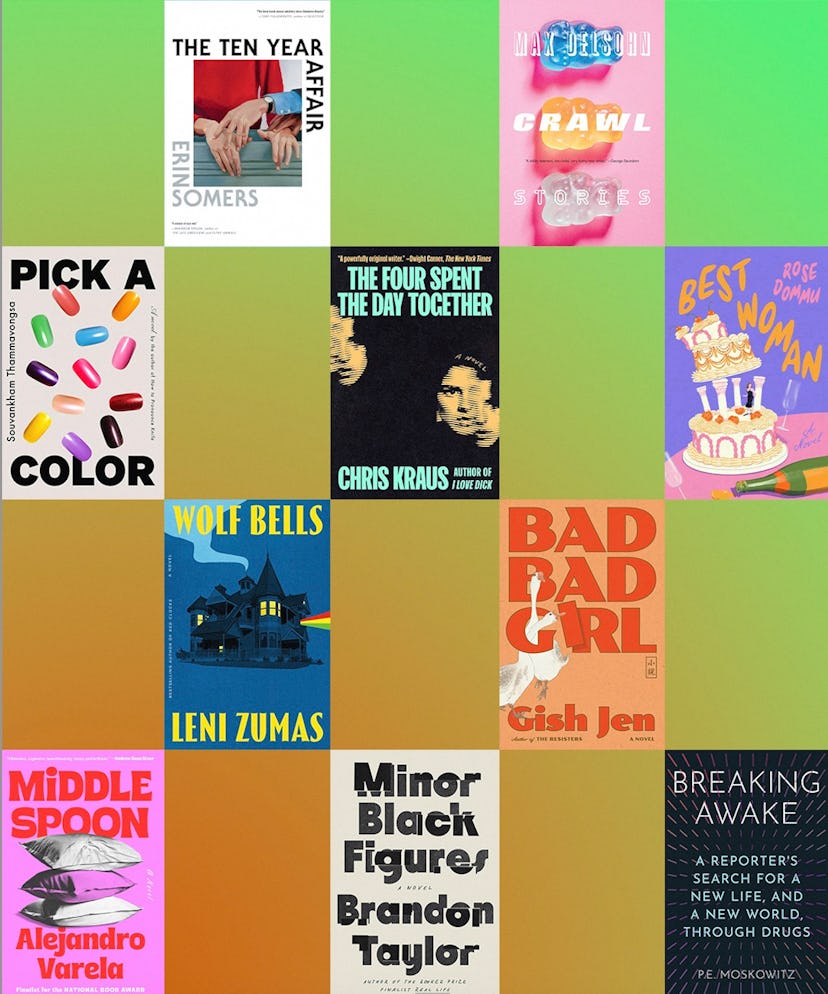It’s back-to-school season and here’s your syllabus: the best books of the fall. This autumn's standout releases range from an intimate Jane Birkin biography to explorations of drug culture, contemporary fiction about a modern Casanova, and more than one satire of New York's art world. Plus, a couple of older books worth revisiting.
In a welcome, confident march into the trauma plot conversation, P.E. Moskowitz’s non-fiction collection mixes personal writing and reporting to discuss drugs—for therapy, for distraction, for fun. As Moskowitz argues, it’s a tough time to be alive; to change, cope, and grow, maybe we need to “get a little weird with it.”
Varela has delivered an epistolary polyamory novel about a queer couple in Brooklyn. In it, the letter-writer has a fascinating need to calculate the incalculable—for example, measuring the grief of a breakup. Varela’s analysis of gay life in New York is delightful, and just this side of withering.
Two runaway children seek solace at a failing group home run by a former rock music genius, in a mansion by the sea. It’s a tense, devastating novel about “semi-radical hospitality” and people trying to do the best they can for each other under unlivable circumstances.
A sequel of sorts to her last novel, No One is Talking About This, Lockwood’s latest is the writer at her best: mystified, curious, pathetic, absurd, yearning, and paralyzed with wonder. Reeling from a loss, the narrator contracts long-COVID and has a break with her sense of personhood. It’s a book about how we square the uncanny with rationality, how we understand our lives.
Reading this book feels like falling into a whirlpool: it’s inescapable. Two adult siblings, the young poet Salim and the semi-shut-in Sarah, embark on a quest to find their long-gone mother in order to save their dying grandmother. Worlds collide—both virtual and familial.
This queer, romantic comedy of manners takes place in the week leading up to a humid Florida wedding. The “best woman” at her brother’s wedding finds that the maid of honor is her unattainable, ultra-cool high school crush. Full of snappy pop culture references, Dommu is an especially tender writer of our awkward little yearnings. As she writes, “all the uncomfortable little moments buzzing around like gnats in August.”
A former boxer turned salon owner—a gruff and tough misanthrope with just one finger—is the protagonist of this confident, ominous novel. Set over one day, this world of glossy, colorful beauty-making is told in an ice-cold voice. The novel features a dizzying lecture about the different shades of red.
Meltzer’s writing is always incisive, stylish, and attuned to revealing paradoxes—which makes her an excellent guide to one of fashion’s biggest ironies: that Jane Birkin, an Englishwoman, is France’s enduring fashion It-girl. Meltzer’s reporting is particularly strong when she analyzes the irresistible actress’ various homes: in her apartment with her ex-husband, Serge Gainsbourg, he kept large photos of his other lovers (Anna Karina, Petula Clark, Catherine Deneuve), and she had a chandelier hanging over her bathtub.
Kraus's latest book connects several disparate themes: a brutal meth-fueled murder by three teenagers, reflections on childhood, and notes on the gentrification of Los Angeles. The latter thread likely draws on her 2017 fracas, where activists protested art-washing in Los Angeles’s Boyle Heights—specifically, an event Kraus presented at a gallery in the neighborhood. A banner that became famous in L.A. art circles read “I LOVE DIckSPLACEMENT,” a play on her book “I Love Dick.”
“Are you an artist or a pollster? You can’t run PR and make art at the same time?” It’s a question posed at the beginning of Taylor’s latest novel about a Black artist in a creative crisis. The convergence of identity politics with art and capitalism—or as a character puts it, “the intricacies of QPOC artistic resistance in a commodified era”—animates this semi-scornful romp through New York’s slippery, venomous art world.
This book started as a daughter’s memoir of her mother and slipped into fiction. As one character thinks, when confronted about the influence of our families: “It had never occurred to me before that ideas got put in your head—that they came from somewhere and you didn’t just think them.”
When two parents meet in their Hudson Valley small town, the time-space continuum splits and, over the next ten years, they pursue an affair in one timeline and restraint in another. It’s an impeccable, ultra-dry, sometimes mocking examination of young middle age. (On a newly polyamorous couple: “They sometimes had group sex, but mostly they had conversations.”)
A parade of young, transgender men populate this melancholic, funny short story collection. They hunt for love, validation, stand-up gigs, the ideal sex playlists, new forms of desire, and friendship in 2010s Seattle. The book roasts West Coast tech gentrification and queer culture alike.
Two obsessive, competitive, beautiful grad school friends contend with a disaster: a shortage of uppers in New York. Over the course of the novel, one, a wealthy Southern filmmaker, marries and completes her film; the other, a cash-strapped writer, dawdles gloriously and resentfully. It’s blunt and deadpan.
Never-employed, oblivious, talentless, roving, and utterly gorgeous: this is the Casanova of early 21st-century New York. But after the pandemic, 29-year-old Adrian may have aged out of the beauty that makes a dilettantish life alluring. Davis’ novel is a meditation of youth, loss, queerness, friendship, and a comparison of two plagues (COVID and AIDS). Intoxicating writing—a banger on every page.
For a Little Extra: Two Older Works Worth Adding to Your List
These three volumes of Garner’s diaries, which span from 1978 to 1998, shows the Australian writer grappling with the vicissitudes of daily life: aging, big loves, creative and professional elations and frustrations, housekeeping, literary world rivalries, everyday fashion, thorny friendships, and making art. She thinks better than almost anyone.
This slinky, sexy, slim novel from 1986, translated into English by Emma Ramadan in 2015, is an experiment with gender and queerness. It takes place, mostly, in an elusive Parisian dance club.
